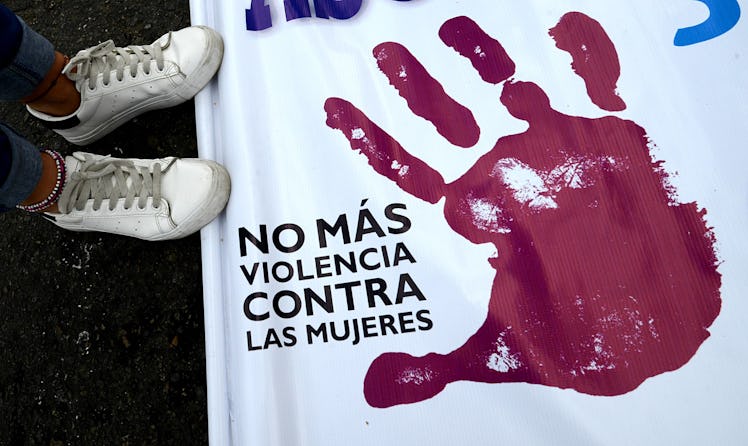
These Beauty Queens Just Flipped The Pageant Script In A Powerful Way
A very powerful thing happened during the Miss Peru beauty pageant on Oct. 29. The ceremony bucked the tradition of having each woman state their measurements, and instead allowed every single contestant to deliver an important, public service message. And the video of beauty queens talking about violence against women in Peru was all kinds of inspiring, and I'm currently sending so, so many snaps to those contestants.
For those of you unfamiliar with the whole pageant process, contestants will sometimes be asked to step forward and state their bust, waist, and hip measurements. Only this time, these beauty queens were broadcasting some very different — and far, far more serious — facts and figures (h/t to Buzzfeed for the translations).
The women discussed sexual violence and harassment in Peru, and the stats are completely staggering.
Here's just a few of them:
My name is Camila Canicoba and I represent the department of Lima. My measurements are 2,202 cases of femicide reported in the last nine years in my country.
My name is Juana Acevedo and my measurements are: more than 70% of women in our country are victims of street harassment.
My name is Romina Lozano and I represent the constitutional province of Callao, and my measurements are 3,114 women victims of trafficking up until 2014.
My name is Bélgica Guerra and I represent Chincha. My measurements are the 65% of university women which are assaulted by their partners.
You can watch the statistics (in Spanish) beginning at about the 3:40 mark in the below video.
Jessica Newton, the pageant’s organizer, told Buzzfeed News that the 2018 Miss Peru competition was designed specifically around addressing gender violence.
“Everyone who does not denounce and everyone who does not do something to stop this is an accomplice,” Newton explained.
Between 2009 and 2015, more than 700 women were killed in Peru as the result of femicide, a term used to describe domestic violence and sex-based crimes, according to Human Rights Watch. In 2017, reports of gender violence leaped 26% between January and April, per Tele Sur.
The Miss Peru pageant screened images of women who had been killed or assaulted in Peru, and the closing Q&A of the night asked each beauty queen how they would change or strengthen laws to protect women.
The Leslie Shaw song "Always Stronger," written about domestic violence, played as the finalists walked for the bikini portion of the evening.
This isn't the first time that Peruvians have stood up against this trend of violence.
In Aug. 2016, more than 50,000 women's rights activists took to the streets of Lima to protest the country's problem with femicide, sexual harassment, and assault, The Guardian reported.
“This march is a cry against impunity, it’s a cry for equality and for the decent treatment of women,” Ana María Romero, Peru’s minister for women, told The Guardian. “It will be a milestone, it will mark a before and after. There’s more citizen awareness about women’s rights.”
Romero noted that, as of 2016, an average of 10 women are murdered every month in Peru. She said,
Our problem is not a lack of legislation, it is how we apply the law. Those in charge of justice need more sensitivity and a better understanding of the rights of the women.
It’s fundamental to eradicate the macho and homophobic culture in this country. Heading towards the bicentenary of our independence we still objectify women or naturalise violent conduct against her. That belongs in a primitive era and has no place in the 21st century.
The protest followed a string of 2016 sister marches in Mexico, Brazil, Bolivia, Columbia, and Argentina called #NiUnaMenos (Not One Less). Their slogan was “Ni una mujer menos, ni una muerte más (Not one woman less, not one more death)."
These marches sparked some important conversations.
Victoria, a participant in the Argentinian protest, told North American Congress on Latin America,
Many friends told me about family discussions about the protest when surprised fathers heard for the first time that their daughters had been groped when they were younger, or that men in the street had exposed themselves to them.
Another participant added, “I was surprised by many men who expressed their concern about these issues from I think a feminist perspective.”
Here's hoping that all of these incredible, brave moments of activism start to spark some crucial change, and not just in Latin America.